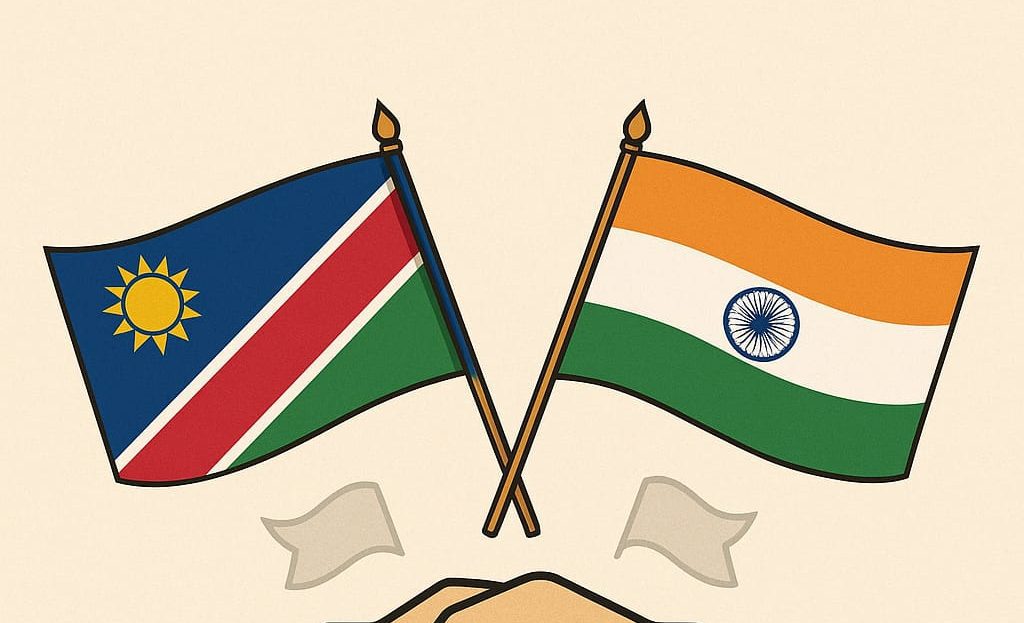Prime Minister Narendra Modi is visiting Namibia on Wednesday, marking the final leg of his five-nation tour and the first visit by an Indian Prime Minister to the African nation in nearly three decades.
The visit is expected to further deepen ties between India and Namibia. The two countries share a historic relationship rooted in India’s steadfast support for Namibia’s independence struggle. India was among the earliest advocates for Namibian freedom, raising the issue at the United Nations as early as 1946 and hosting the first overseas office of the South West Africa People’s Organisation (SWAPO) in 1986.
During his stay in the capital, Windhoek, PM Modi will hold bilateral talks with President Netumbo Nandi-Ndaitwah and address a joint sitting of Namibia’s Parliament. A key highlight of the visit will be the signing of a technology agreement enabling unified payment interoperability between the two countries, aimed at enhancing cooperation in the fintech and digital sectors, according to a statement from the Ministry of External Affairs.
Namibia’s rich reserves of uranium, copper, cobalt, rare earth minerals and its recent oil discoveries are drawing renewed global attention. The country is the world’s fourth-largest producer of uranium oxide, which fuels the nuclear industry, and also produces zinc and gem-quality diamonds. With growing global demand for clean energy and battery storage, Namibia’s potential to develop new mining projects for cobalt, lithium, and rare earth elements has gained fresh relevance.
Bilateral trade between the two nations stood at around $814 million in 2023–24, with Indian exports accounting for over half that figure. Indian investments in Namibia are estimated at nearly $800 million, largely in the mining sector, including zinc and diamonds.
A notable symbol of the trust between the two nations remains the translocation of eight cheetahs from Namibia to India’s Kuno National Park in 2022 — the world’s first intercontinental transfer of a major carnivore species.
Bilateral relations have continued to strengthen over the years through high-level exchanges, development cooperation and people-to-people contacts. Then President of India, Pranab Mukherjee, paid a State Visit to Namibia in 2016, while Namibia’s President Hage Geingob attended the India–Africa Forum Summit in New Delhi in 2015. PM Modi and President Geingob last met on the sidelines of the UN General Assembly in 2019.
In June last year, External Affairs Minister S. Jaishankar visited Namibia, calling on President Geingob and co-chairing the first Joint Commission Meeting. He also inaugurated the India–Namibia Centre for Excellence in Information Technology in Windhoek.
India continues to extend development assistance and capacity-building support to Namibia through scholarships, defence training programmes and technical cooperation. Indian experts are deputed to Namibian institutions, and an Indian Air Force Technical Team has been training Namibian helicopter pilots since 1996.
The countries are exploring opportunities to expand cooperation in mining, energy, health, agriculture and infrastructure. Negotiations for a Preferential Trade Arrangement between India and the Southern African Customs Union (SACU), with Namibia as coordinator, are ongoing.
Cultural ties have also grown steadily, with regular cultural events, yoga sessions and artistic exchanges. Approximately 450 Indians, NRIs and PIOs reside in Namibia today, contributing to business and community initiatives through bodies such as the India–Namibia Chamber of Commerce and Industry and the India Namibia Friendship Association.










